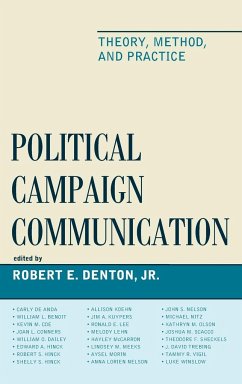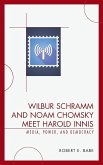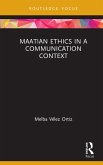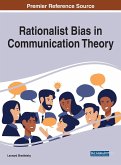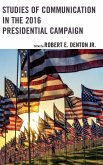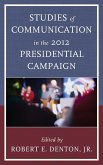Political Campaign Communication
Theory, Method, and Practice
Herausgeber: Denton, Robert E.
Political Campaign Communication
Theory, Method, and Practice
Herausgeber: Denton, Robert E.
- Gebundenes Buch
- Merkliste
- Auf die Merkliste
- Bewerten Bewerten
- Teilen
- Produkt teilen
- Produkterinnerung
- Produkterinnerung
This volume examines political campaign communication around the concepts of theory, method and practice. It contains studies of political campaign communication using a wide range of empirical, rhetorical, and social science methodologies and reflects the growth and maturity of the discipline of political communication.
Andere Kunden interessierten sich auch für
![Wilbur Schramm and Noam Chomsky Meet Harold Innis Wilbur Schramm and Noam Chomsky Meet Harold Innis]() Robert E. BabeWilbur Schramm and Noam Chomsky Meet Harold Innis151,99 €
Robert E. BabeWilbur Schramm and Noam Chomsky Meet Harold Innis151,99 €![Maatian Ethics in a Communication Context Maatian Ethics in a Communication Context]() Melba Vélez OrtizMaatian Ethics in a Communication Context70,99 €
Melba Vélez OrtizMaatian Ethics in a Communication Context70,99 €![Rationalist Bias in Communication Theory Rationalist Bias in Communication Theory]() Rationalist Bias in Communication Theory239,99 €
Rationalist Bias in Communication Theory239,99 €![Bilingual Health Communication Bilingual Health Communication]() Elaine HsiehBilingual Health Communication257,99 €
Elaine HsiehBilingual Health Communication257,99 €![Studies of Communication in the 2016 Presidential Campaign Studies of Communication in the 2016 Presidential Campaign]() Studies of Communication in the 2016 Presidential Campaign131,99 €
Studies of Communication in the 2016 Presidential Campaign131,99 €![Studies of Communication in the 2012 Presidential Campaign Studies of Communication in the 2012 Presidential Campaign]() Studies of Communication in the 2012 Presidential Campaign141,99 €
Studies of Communication in the 2012 Presidential Campaign141,99 €![Studies of Communication in the 2020 Presidential Campaign Studies of Communication in the 2020 Presidential Campaign]() Studies of Communication in the 2020 Presidential Campaign118,99 €
Studies of Communication in the 2020 Presidential Campaign118,99 €-
-
-
This volume examines political campaign communication around the concepts of theory, method and practice. It contains studies of political campaign communication using a wide range of empirical, rhetorical, and social science methodologies and reflects the growth and maturity of the discipline of political communication.
Hinweis: Dieser Artikel kann nur an eine deutsche Lieferadresse ausgeliefert werden.
Hinweis: Dieser Artikel kann nur an eine deutsche Lieferadresse ausgeliefert werden.
Produktdetails
- Produktdetails
- Verlag: Lexington Books
- Seitenzahl: 444
- Erscheinungstermin: 14. Juni 2017
- Englisch
- Abmessung: 235mm x 157mm x 28mm
- Gewicht: 790g
- ISBN-13: 9781498530026
- ISBN-10: 1498530028
- Artikelnr.: 47881261
- Herstellerkennzeichnung
- Libri GmbH
- Europaallee 1
- 36244 Bad Hersfeld
- gpsr@libri.de
- Verlag: Lexington Books
- Seitenzahl: 444
- Erscheinungstermin: 14. Juni 2017
- Englisch
- Abmessung: 235mm x 157mm x 28mm
- Gewicht: 790g
- ISBN-13: 9781498530026
- ISBN-10: 1498530028
- Artikelnr.: 47881261
- Herstellerkennzeichnung
- Libri GmbH
- Europaallee 1
- 36244 Bad Hersfeld
- gpsr@libri.de
Edited by Robert E. Denton Jr. - Contributions by William L. Benoit; Kevin M. Coe; Joan L. Conners; William O. Dailey; Carly de Anda; Robert E. Denton Jr.; Edward A. Hinck; Robert S. Hinck; Shelly S. Hinck; Allison Koehn; Jim A. Kuypers; Ron Lee; Melody L
Contents Acknowledgments Introduction: Political Campaign
Communication-Theory, Method and Practice and the Emergence of a Discipline
of Study Robert E. Denton, Jr. Section I: Theory Chapter 1: The Functional
Theory of Political Campaign Discourse William L. Benoit Chapter 2: "What a
Snob": The Reconciliation of Higher Education and Neoliberalism in the 2012
Republican Presidential Primary Luke Winslow and Carly de Anda Chapter 3:
What is Happening There?: Norwegian Newspaper Coverage of the 2016 U.S.
Presidential Election Michael Nitz Chapter 4: Intensity of Face Threats in
the 2008, 2012 and 2016 US Presidential Debates William O. Dailey, Shelly
S. Hinck, Robert S. Hinck, and Edward A. Hinck Chapter 5: Too Early to be
Funny? An Analysis of Late Night Comedy During the 2016 U.S. Presidential
Primaries Michael Nitz, Allison Koehn, and Hayley McCarron Section II:
Method Chapter 6: Presidential Debate and Conflict Bias Joan L. Conners
Chapter 7: Main Stream Press Framing of the RNC and DNC 2016 Presidential
Nomination Acceptance Speeches: Terministic Screens and the Discovery of
the Worldview of the Press Jim A. Kuypers Chapter 8: Making a Case for
Textual Criticism: Hillary Studies and the State of Political Campaign
Scholarship Melody Lehn Chapter 9: Barack Obama's Response to the "Angry
Black Man" Race Card: A Critical Analysis of "A More Perfect Union" Ronald
E. Lee and Aysel Morin Chapter 10: Kenney and Identification in Houston J.
David Trebing Section III: Practice Chapter 11: Political Election TV Spots
William L. Benoit Chapter 12: Campaign Politics of Sight and Sound:
Populist Rhetoric in a Media Maelstrom John S. Nelson and Anna Lorien
Nelson Chapter 13: The Refutational Power of Ad Personam and Tu Quoque
Attacks in Advancing Trump's "Change" Counter-Narrative During the 2016
General Election Presidential Debates Kathryn M. Olson Chapter 14: Acting
"Presidential": The Modern Campaign Meets the Ubiquitous Presidency Joshua
M. Scacco and Kevin M. Coe Chapter 15: Orchestrating "The Show:" The 2016
Political Party Conventions in Historical Context Theodore F. Sheckels
Chapter 16: National Conventions: Evolving Functions and Forms Tammy R.
Vigil Chapter 17: Tweeting Our Differences: Comparing Candidate
Communication in Mixed-Gender and Same-Gender Elections Lindsey M. Meeks
Bibliography About the Editor and Contributors
Communication-Theory, Method and Practice and the Emergence of a Discipline
of Study Robert E. Denton, Jr. Section I: Theory Chapter 1: The Functional
Theory of Political Campaign Discourse William L. Benoit Chapter 2: "What a
Snob": The Reconciliation of Higher Education and Neoliberalism in the 2012
Republican Presidential Primary Luke Winslow and Carly de Anda Chapter 3:
What is Happening There?: Norwegian Newspaper Coverage of the 2016 U.S.
Presidential Election Michael Nitz Chapter 4: Intensity of Face Threats in
the 2008, 2012 and 2016 US Presidential Debates William O. Dailey, Shelly
S. Hinck, Robert S. Hinck, and Edward A. Hinck Chapter 5: Too Early to be
Funny? An Analysis of Late Night Comedy During the 2016 U.S. Presidential
Primaries Michael Nitz, Allison Koehn, and Hayley McCarron Section II:
Method Chapter 6: Presidential Debate and Conflict Bias Joan L. Conners
Chapter 7: Main Stream Press Framing of the RNC and DNC 2016 Presidential
Nomination Acceptance Speeches: Terministic Screens and the Discovery of
the Worldview of the Press Jim A. Kuypers Chapter 8: Making a Case for
Textual Criticism: Hillary Studies and the State of Political Campaign
Scholarship Melody Lehn Chapter 9: Barack Obama's Response to the "Angry
Black Man" Race Card: A Critical Analysis of "A More Perfect Union" Ronald
E. Lee and Aysel Morin Chapter 10: Kenney and Identification in Houston J.
David Trebing Section III: Practice Chapter 11: Political Election TV Spots
William L. Benoit Chapter 12: Campaign Politics of Sight and Sound:
Populist Rhetoric in a Media Maelstrom John S. Nelson and Anna Lorien
Nelson Chapter 13: The Refutational Power of Ad Personam and Tu Quoque
Attacks in Advancing Trump's "Change" Counter-Narrative During the 2016
General Election Presidential Debates Kathryn M. Olson Chapter 14: Acting
"Presidential": The Modern Campaign Meets the Ubiquitous Presidency Joshua
M. Scacco and Kevin M. Coe Chapter 15: Orchestrating "The Show:" The 2016
Political Party Conventions in Historical Context Theodore F. Sheckels
Chapter 16: National Conventions: Evolving Functions and Forms Tammy R.
Vigil Chapter 17: Tweeting Our Differences: Comparing Candidate
Communication in Mixed-Gender and Same-Gender Elections Lindsey M. Meeks
Bibliography About the Editor and Contributors
Contents Acknowledgments Introduction: Political Campaign
Communication-Theory, Method and Practice and the Emergence of a Discipline
of Study Robert E. Denton, Jr. Section I: Theory Chapter 1: The Functional
Theory of Political Campaign Discourse William L. Benoit Chapter 2: "What a
Snob": The Reconciliation of Higher Education and Neoliberalism in the 2012
Republican Presidential Primary Luke Winslow and Carly de Anda Chapter 3:
What is Happening There?: Norwegian Newspaper Coverage of the 2016 U.S.
Presidential Election Michael Nitz Chapter 4: Intensity of Face Threats in
the 2008, 2012 and 2016 US Presidential Debates William O. Dailey, Shelly
S. Hinck, Robert S. Hinck, and Edward A. Hinck Chapter 5: Too Early to be
Funny? An Analysis of Late Night Comedy During the 2016 U.S. Presidential
Primaries Michael Nitz, Allison Koehn, and Hayley McCarron Section II:
Method Chapter 6: Presidential Debate and Conflict Bias Joan L. Conners
Chapter 7: Main Stream Press Framing of the RNC and DNC 2016 Presidential
Nomination Acceptance Speeches: Terministic Screens and the Discovery of
the Worldview of the Press Jim A. Kuypers Chapter 8: Making a Case for
Textual Criticism: Hillary Studies and the State of Political Campaign
Scholarship Melody Lehn Chapter 9: Barack Obama's Response to the "Angry
Black Man" Race Card: A Critical Analysis of "A More Perfect Union" Ronald
E. Lee and Aysel Morin Chapter 10: Kenney and Identification in Houston J.
David Trebing Section III: Practice Chapter 11: Political Election TV Spots
William L. Benoit Chapter 12: Campaign Politics of Sight and Sound:
Populist Rhetoric in a Media Maelstrom John S. Nelson and Anna Lorien
Nelson Chapter 13: The Refutational Power of Ad Personam and Tu Quoque
Attacks in Advancing Trump's "Change" Counter-Narrative During the 2016
General Election Presidential Debates Kathryn M. Olson Chapter 14: Acting
"Presidential": The Modern Campaign Meets the Ubiquitous Presidency Joshua
M. Scacco and Kevin M. Coe Chapter 15: Orchestrating "The Show:" The 2016
Political Party Conventions in Historical Context Theodore F. Sheckels
Chapter 16: National Conventions: Evolving Functions and Forms Tammy R.
Vigil Chapter 17: Tweeting Our Differences: Comparing Candidate
Communication in Mixed-Gender and Same-Gender Elections Lindsey M. Meeks
Bibliography About the Editor and Contributors
Communication-Theory, Method and Practice and the Emergence of a Discipline
of Study Robert E. Denton, Jr. Section I: Theory Chapter 1: The Functional
Theory of Political Campaign Discourse William L. Benoit Chapter 2: "What a
Snob": The Reconciliation of Higher Education and Neoliberalism in the 2012
Republican Presidential Primary Luke Winslow and Carly de Anda Chapter 3:
What is Happening There?: Norwegian Newspaper Coverage of the 2016 U.S.
Presidential Election Michael Nitz Chapter 4: Intensity of Face Threats in
the 2008, 2012 and 2016 US Presidential Debates William O. Dailey, Shelly
S. Hinck, Robert S. Hinck, and Edward A. Hinck Chapter 5: Too Early to be
Funny? An Analysis of Late Night Comedy During the 2016 U.S. Presidential
Primaries Michael Nitz, Allison Koehn, and Hayley McCarron Section II:
Method Chapter 6: Presidential Debate and Conflict Bias Joan L. Conners
Chapter 7: Main Stream Press Framing of the RNC and DNC 2016 Presidential
Nomination Acceptance Speeches: Terministic Screens and the Discovery of
the Worldview of the Press Jim A. Kuypers Chapter 8: Making a Case for
Textual Criticism: Hillary Studies and the State of Political Campaign
Scholarship Melody Lehn Chapter 9: Barack Obama's Response to the "Angry
Black Man" Race Card: A Critical Analysis of "A More Perfect Union" Ronald
E. Lee and Aysel Morin Chapter 10: Kenney and Identification in Houston J.
David Trebing Section III: Practice Chapter 11: Political Election TV Spots
William L. Benoit Chapter 12: Campaign Politics of Sight and Sound:
Populist Rhetoric in a Media Maelstrom John S. Nelson and Anna Lorien
Nelson Chapter 13: The Refutational Power of Ad Personam and Tu Quoque
Attacks in Advancing Trump's "Change" Counter-Narrative During the 2016
General Election Presidential Debates Kathryn M. Olson Chapter 14: Acting
"Presidential": The Modern Campaign Meets the Ubiquitous Presidency Joshua
M. Scacco and Kevin M. Coe Chapter 15: Orchestrating "The Show:" The 2016
Political Party Conventions in Historical Context Theodore F. Sheckels
Chapter 16: National Conventions: Evolving Functions and Forms Tammy R.
Vigil Chapter 17: Tweeting Our Differences: Comparing Candidate
Communication in Mixed-Gender and Same-Gender Elections Lindsey M. Meeks
Bibliography About the Editor and Contributors

